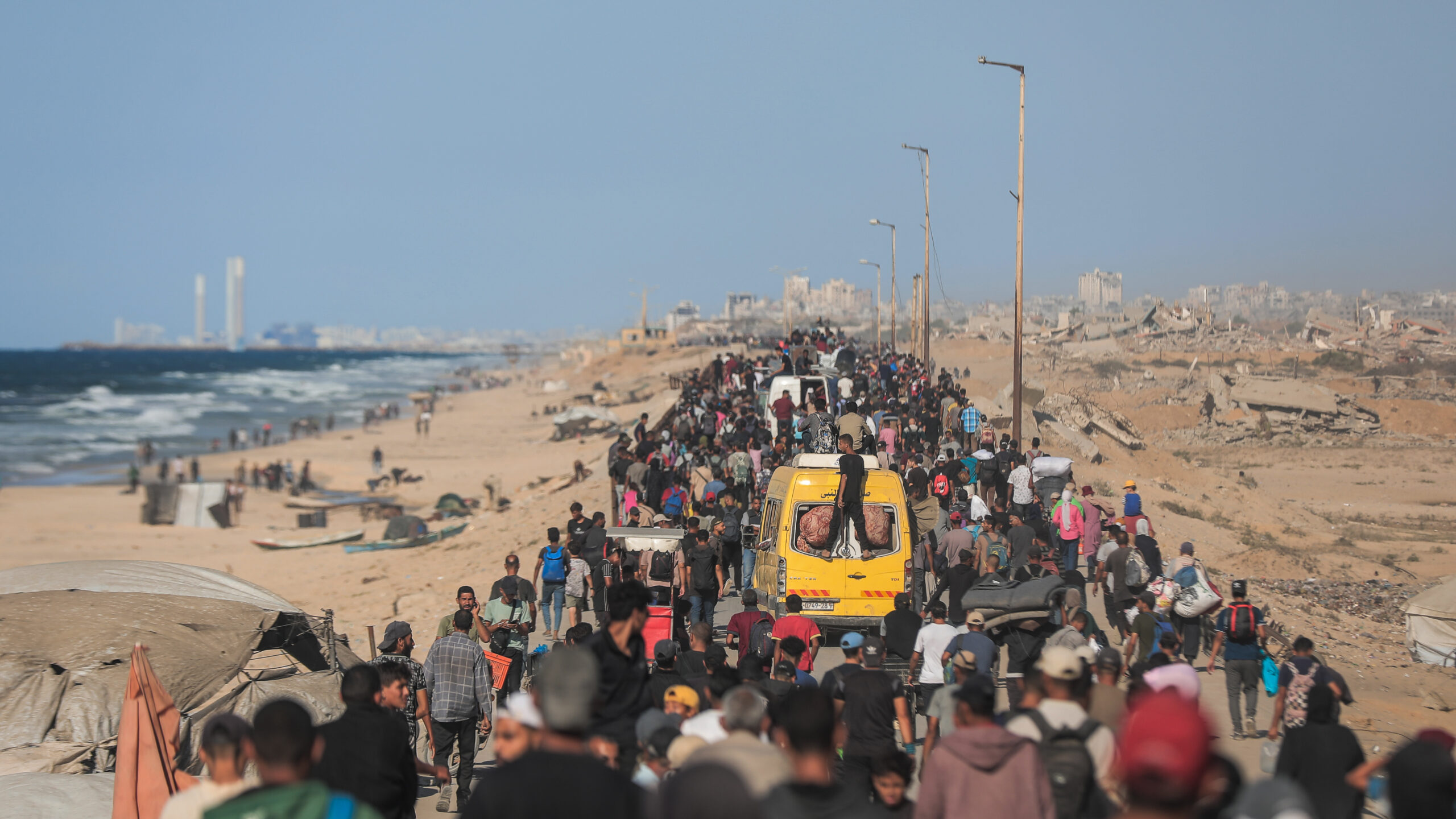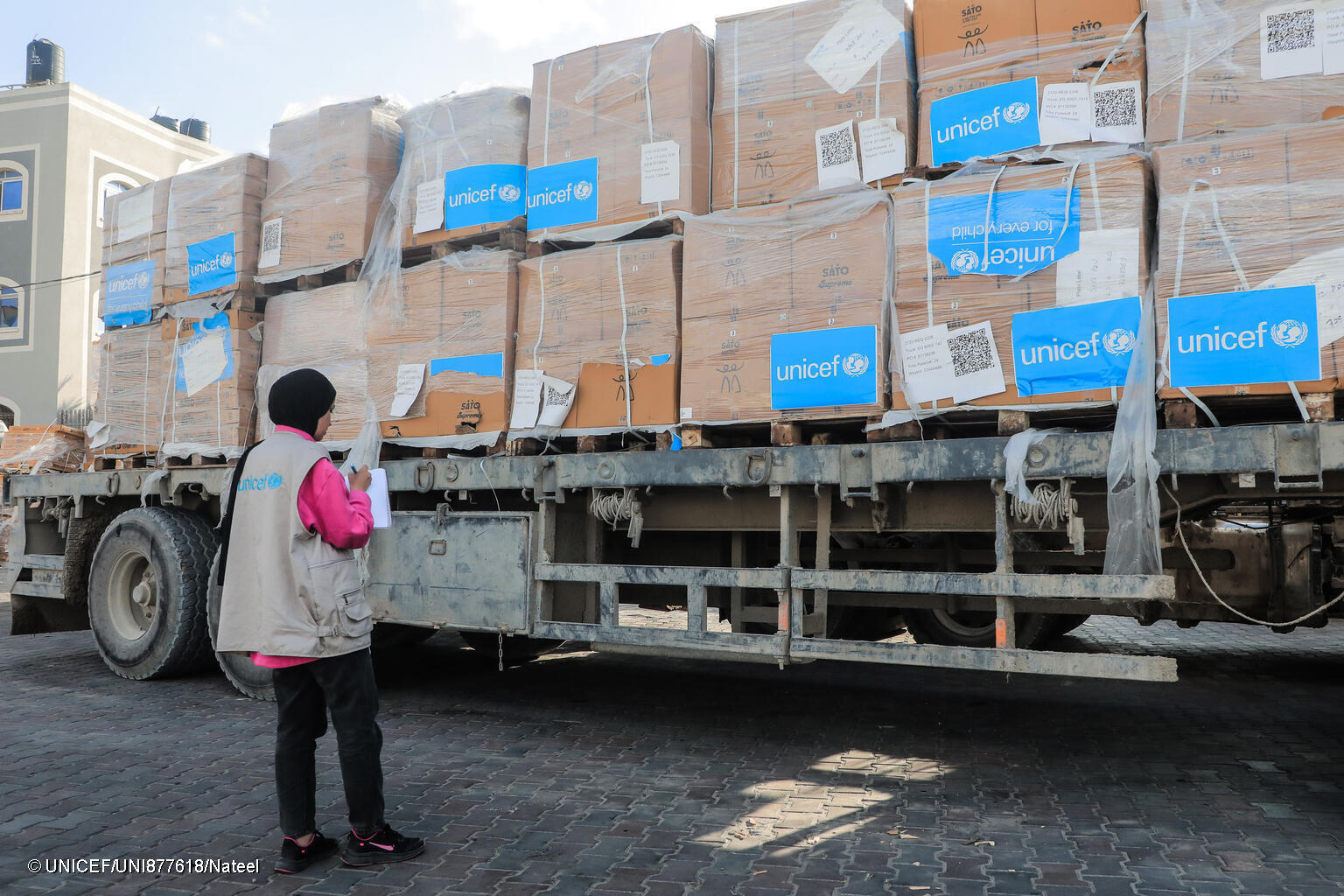
Ceasefire in Gaza but famine remains
The ceasefire in Gaza offers long-overdue hope. For the sake of every child in the region, it must hold.
After two years of relentless conflict, the children of Gaza are facing a crisis of unimaginable scale. More than 64,000 Palestinian children have been reported killed or injured. Threat of famine persists. Homes lie in ruins, schools have been reduced to rubble and essential infrastructure has been devastated.
This ceasefire is a crucial opportunity — not only to end the violence, but to confront the severe hunger and malnutrition still threatening children’s lives. Food shortages, starvation-related deaths and acute malnutrition remain widespread. Famine conditioners were confirmed in parts of Gaza in August 2025, affecting over half a million people, and more than 320,000 children under five are at risk of acute malnutrition.
UNICEF is working urgently to scale up the delivery of life-saving nutrition supplies — including Ready-to-Use Therapeutic Food, Complementary Food, Lipid-Based Nutrient Supplements, High-Energy Biscuits, and Infant Formula — to prevent and treat malnutrition among the most vulnerable.
UNICEF has never stopped delivering for children in Gaza. Throughout these devastating months, we have provided vital aid — from water and medical supplies to psychosocial support — and we will continue to do so. But to reach every child in need, we must have full, safe and unimpeded access to our supplies and the families who depend on them.
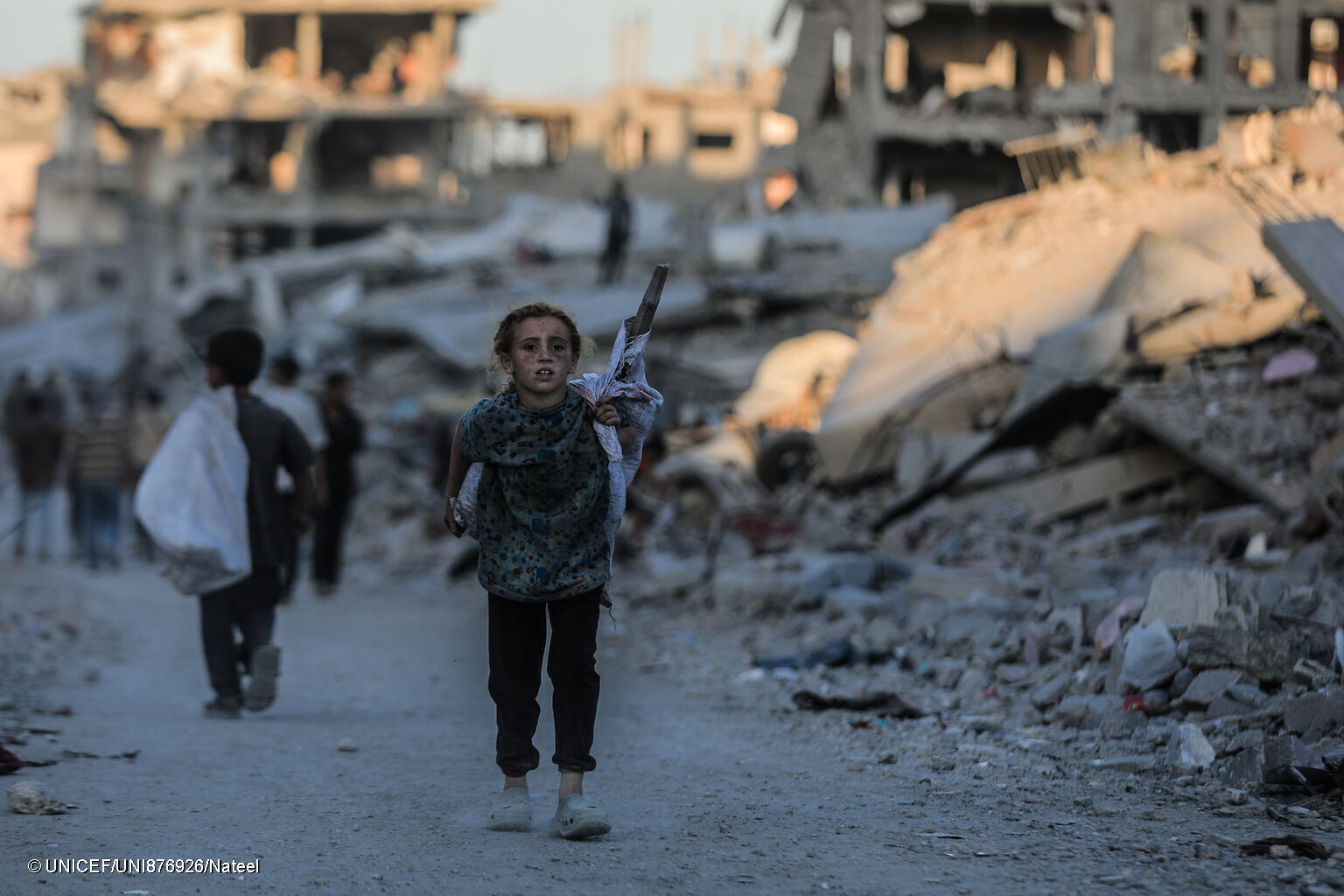
On 10 October 2025, a child walks among thousands of Palestinian families who are moving along the coastal road back to northern Gaza, amid the extreme devastation of infrastructure.
The humanitarian situation in Gaza remains catastrophic
– Mass Displacement: Nearly 1.9 million people (85% of the population) have been displaced, with families sheltering in overcrowded, makeshift facilities lacking reliable access to food, clean water, and medical care.
– Nutrition Crisis: The entire child population under five – over 320,000 children – is at risk of acute malnutrition.
– Healthcare Collapse: Over 80% of health facilities are non-functional, severely limiting access to medical services.
– Water & Sanitation Breakdown: Widespread damage to water and sanitation infrastructure has left much of the population without safe drinking water, increasing the risk of disease outbreaks.
– Education Crisis: 95% of schools have been partially or completely destroyed, depriving hundreds of thousands of children of education and stability.
– Winter Threat: Approaching winter will worsen conditions, especially for children who lack adequate shelter, clothing, and heating.
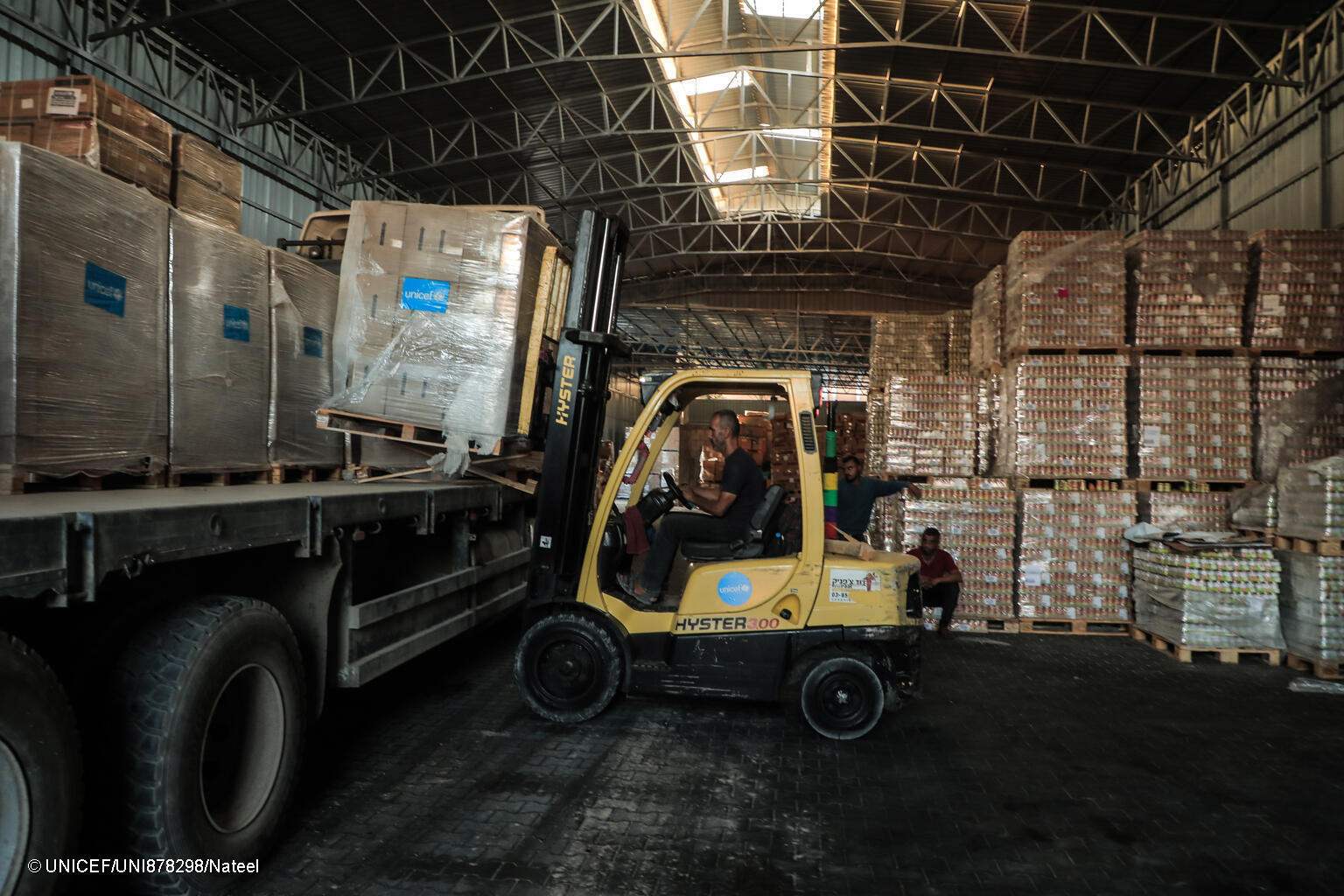
Supplies are off-loaded at a UNICEF warehouse in Deir Al Balah, Central Gaza, State of Palestine, on 13 October 2025, after the arrival of UNICEF trucks carrying life-saving nutrition, shelter and hygiene items.
Ceasefire Plan
UNICEF’s three-month Gaza Ceasefire Response Plan is a bold and compassionate blueprint to deliver essential services, restore dignity, and protect the most vulnerable. But we cannot do it alone. We need your support.
Two priorities stand out as most urgent:
– Winterisation: With the cold season fast approaching, hundreds of thousands of children are sheltering in tents, tarpaulins and damaged buildings with no insulation or heating. Without immediate intervention, the risk of hypothermia, respiratory infections and preventable deaths will rise sharply. UNICEF is working to deliver warm clothing, blankets, tarpaulins and family tents to protect children from the harsh winter conditions.
– Nutrition: UNICEF is responding to the devastating impact of the recent famine classification and acting urgently to avert further deterioration. Over 42,000 children under five are already malnourished. UNICEF is scaling up nutrition centres, delivering therapeutic food and milk, and expanding services to reach pregnant and breastfeeding women and children of all ages. These interventions are critical to saving lives and reversing the spread of acute and chronic malnutrition.
These efforts are part of a wider integrated response that includes restoring clean water and sanitation, rebuilding education and health services, and providing mental health and child protection support. Every intervention is designed to be inclusive, locally driven, and responsive to the needs of the most vulnerable.
UNICEF's Ceasefire Plan
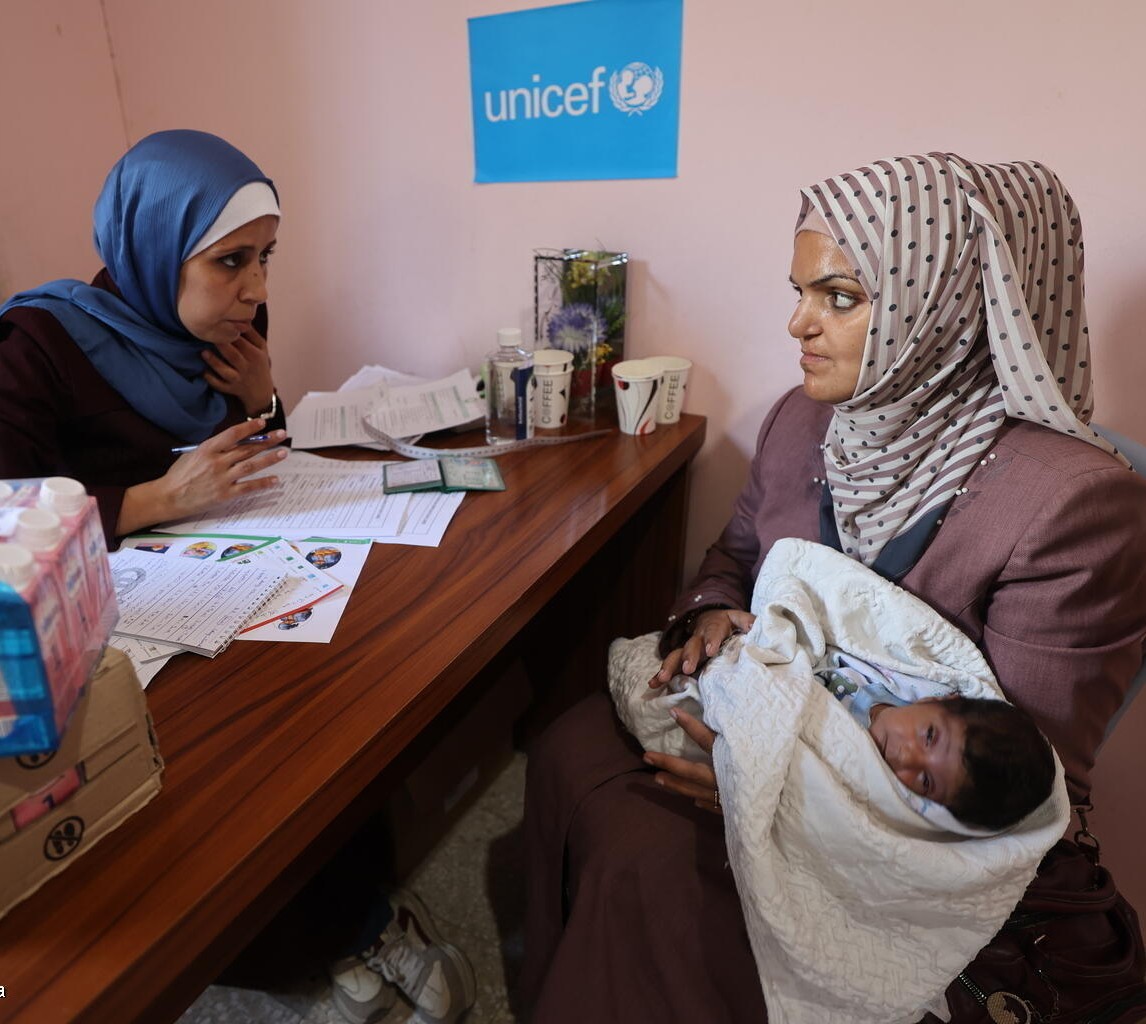
UNICEF’s work in Gaza goes far beyond the delivery of aid parcels
We repair water wells and sewage systems, provide fuel to desalination plants, and deliver safe water via trucks since water networks have been largely destroyed.
Our nutrition programmes include not only therapeutic food but also malnutrition screening, and breastfeeding counselling for mothers.
We provide humanitarian cash transfers to help tackle hunger even when aid access is limited, giving vulnerable families the purchasing power and dignity to buy food and essentials in a highly volatile market.
We have delivered obstetric and trauma kits, installed incubators and ventilators in neonatal intensive care units, and supported maternal and newborn health services through training and supervision.
We lead on the planning and delivery of major routine immunisation campaigns to protect children in Gaza against deadly diseases like polio and diphtheria.
Despite the devastation, we have also established temporary learning centres, offering children access to play, learning, and psychosocial support.
The scale of need is staggering, but no matter the challenges, UNICEF is on the ground in Gaza doing all we can and we never give up.
It is the support of our donors that enables us to continue this vital work under the most difficult circumstances.
Donate by Cheque or Bank Transfer
UNICEF Ireland, 33 Lower Ormond Quay, Dublin 1, D01 R28
For Bank Transfers, download our bank details PDF below for more information.
Contact Our Teams Directly
Corporate Partnership Team
For businesses looking to support children in Gaza, please contact [email protected] or donate today.
Philanthropy Team
If you or your family office would like to support children in Gaza, please contact Donna Marie O’Donovan, Head of Philanthropy: [email protected] or refer to the donation box below.
Why UNICEF?
UNICEF has been supporting children and families on the ground in the State of Palestine for decades.
The sheer scale of our infrastructure and long-term development work for children means that we are uniquely positioned to respond rapidly and effectively to these crises.
With a vast global procurement and distribution network, including the largest humanitarian warehouse in the world, UNICEF is equipped to respond rapidly with lifesaving supplies and support.
Sustainable interventions are important because crises are not one-time shocks; their impact can last for years. UNICEF’s humanitarian action takes a cross-sectoral approach that includes health, nutrition, water, sanitation and hygiene (WASH), child protection, education, psychosocial support.
Non-political and impartial, we are never neutral when it comes to defending children’s rights and safeguarding their lives and futures.
And we never give up.


